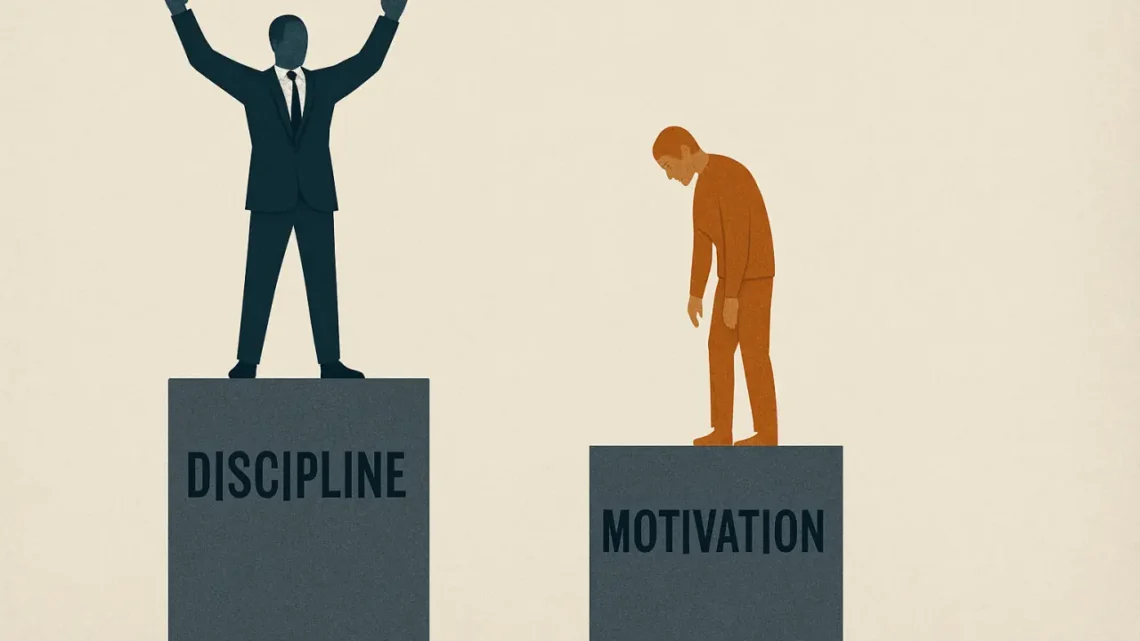
Why Self-Discipline Beats Motivation Every Single Time and How to Build It
You’ve been there. January 1st hits, you watch a 10-minute YouTube video about “becoming the best version of yourself,” and suddenly you’re buzzing with energy.
You buy the gym membership, download the meditation app, clear your phone of distractions, and swear this time will be different.
Trending Now!!:
For three, maybe seven days, you’re unstoppable. Then Wednesday comes. It’s cold. You’re tired.
Netflix dropped a new season. The motivation that felt like rocket fuel last week is now a faint memory. You hit snooze. Again. And again.
If you’ve ever typed “how to stay motivated,” “morning motivation,” “productivity hacks,” or “why can’t I stay consistent,” you already know the dirty secret the $30 billion self-help industry doesn’t want you to admit:
Motivation is a terrible long-term strategy.
Self-discipline, however, is the unsexy, boring, unbreakable force that actually moves the needle. Every single time.
Here’s why self-discipline crushes motivation in every meaningful way – and exactly how to build it even if you’ve failed a hundred times before.
The Fatal Flaws of Motivation
- Motivation is emotion-driven
- It shows up when you feel good and vanishes when you don’t. Emotions are fickle. Deadlines, bad sleep, a fight with your partner, or even low blood sugar can kill it instantly.
- Motivation is external more often than internal
- Most people get hyped from a podcast, a reel, a quote graphic, or seeing someone else’s transformation. As soon as the external stimulus disappears, so does the drive.
- Motivation follows the “lottery mindset”
- It convinces you that one massive burst of effort will fix everything. Reality: 99% of success is small, repeated actions over years.
- Motivation creates a dangerous dependency
- The more you chase the feeling, the more you train your brain to only work when the stars (and dopamine) align.
Self-discipline doesn’t care about any of that.
The Superpower of Self-Discipline
Self-discipline is the ability to do what needs to be done, when it needs to be done, whether you feel like it or not. It’s the reason:
- J.K. Rowling finished Harry Potter while depressed and broke
- Kobe Bryant took 800 shots after practice
- Thomas Edison ran 10,000 failed experiments
- Top creators post every week for years before anyone notices
These people weren’t more motivated than you. They were more disciplined. Science backs this up relentlessly.
- A 2013 study published in Psychological Science found that self-control (not IQ or talent) was the strongest predictor of academic success, wealth, and health later in life.
- The famous Marshmallow Test follow-ups showed that children who could delay gratification grew into adults with better SAT scores, lower BMI, and higher income.
- Researchers at University College London discovered it takes an average of 66 days (not 21) to form a habit – well past the point where motivation has ghosted you.
Discipline isn’t just better than motivation. It’s the only reliable path to long-term results.
The Real Reason Most People Fail (And Stay Stuck)
They treat discipline like a personality trait instead of a muscle. You don’t “have” discipline or “not have” it.
You build it the same way you build biceps – through progressive resistance and consistency. The good news? You can start so small that failure is literally impossible.
How to Build Bulletproof Self-Discipline (Step-by-Step)
1. Win the Morning, Win the Day
The first 60 minutes after waking set the tone. A strong morning routine isn’t about motivation – it’s about stacking small wins before the world has a chance to derail you.
Proven morning routine for discipline:
- Make your bed (instant win + order)
- Drink 500ml water
- 5-10 minutes of movement (walk, stretch, or workout)
- 5 minutes of journaling or planning
- Start your hardest task (eat the frog)
Do this for 30 days straight, and your brain will rewire itself to expect momentum.
2. Use the “Stupid Small” Method
James Clear popularized this in Atomic Habits: Make the habit so easy you can’t say no. Examples:
- Want to read 50 books a year? Read one page.
- Want six-pack abs? Do one push-up.
- Want to write a novel? Write one sentence.
90% of the time, you’ll do way more. The other 10%? You still kept the streak alive.
3. Master the 2-Minute Rule (David Allen – Getting Things Done)
Any task that takes less than two minutes – do it immediately. Emails, texts, dishes, putting clothes away. This prevents small tasks from piling up and killing your mental energy.
4. Design Your Environment Like Your Life Depends on It (Because It Does)
Willpower is finite. Environment is infinite.
- Want to stop doomscrolling? Delete TikTok and Instagram. Use a dumb phone or app blockers (Opal, Freedom, Cold Turkey).
- Want to eat healthy? Don’t buy junk. If it’s not in the house, you can’t eat it at 11 PM.
- Want to wake up early? Charge your phone outside the bedroom and buy a $15 sunrise alarm clock.
You don’t rise to the level of your goals. You fall to the level of your systems.
5. Embrace the “Identity Shift” (The Ultimate Cheat Code)
Stop saying “I want to be fit.” Start saying “I’m an athlete.”
Stop saying “I want to write.” Start saying “I’m a writer.”
Your brain hates incongruence. When you identify as the person who does the thing, skipping it creates discomfort. That discomfort becomes your new motivation – except now it’s internal and permanent.
6. Track Everything Ruthlessly
What gets measured gets managed. Use:
- A simple wall calendar + red X’s (Jerry Seinfeld‘s “don’t break the chain“)
- Apps like Habitica, Streaks, Way of Life, or Notion
- Weekly reviews every Sunday
Seeing a 47-day streak hurts more to break than any alarm clock ever could.
7. Schedule “Discomfort Sessions”
Discipline grows in discomfort. Deliberately do hard things:
- Cold showers
- 5 AM workouts
- Public speaking practice
- Fasting
The more you prove to yourself you can handle discomfort, the less power it has over you.
The Compound Effect: Where Discipline Destroys Motivation
One disciplined day changes nothing.
One disciplined month changes your habits.
One disciplined year changes your life. Math doesn’t lie:
- 1% better every day = 37.78 times better in one year
- Missing 1 day a week (85% consistency) = only 4.9 times better
- Motivation-based effort (let’s be real – 50% consistency) = barely 2 times better
Discipline compounds. Motivation evaporates.
The Final Truth Nobody Says Out Loud
Success is boring. Behind every overnight success are thousands of unsexy, disciplined days nobody saw.
The difference between who you are now and who you want to be in 2027 is not more motivation. It’s more discipline, applied daily, when nobody’s watching, when it’s inconvenient, when you’d rather quit.
Your Next Step (Right Now)
Close this article.
Open your phone.
Set one tiny, stupidly small habit for tomorrow morning.
- One push-up
- One glass of water
- One sentence in your journal
- One minute of meditation
Do it tomorrow. And the next day. And the next.Because motivation won’t be there when you need it. But discipline always will – if you build it.
You don’t need another motivational video.
You need to become the kind of person who simply does the work.
Start today.
Not because you feel like it.
But because that’s who you’ve decided to become.
The world is waiting for the disciplined version of you.
Go build it.

